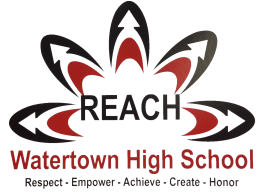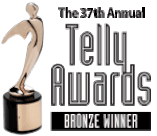"I don't think any industry was ever as closely scrutinized and written about and constantly in the public eye as television."
- Roone Arledge, ABC News & Sports
Units of Study |
2019 - 2020 |
Digital Video Making
Are you passionate about sports? Dance? Computers? Have a story to tell? In this course students will make a documentary video by working in teams, each student participating in one of many aspects of the production. Students will learn how to set up and record interviews, how to shoot sequences, and how to edit their footage. The final projects will be shown online and on the Watertown channel. We will also examine documentary production techniques through a mixture of screenings, discussion, and hands-on exercises. Semester 3 credits
Television News Production
Ever dream about being a sportscaster? How about a news anchor man/woman? Here is your chance to turn your dream into a reality. The course will examine the range of ways in which TV news is made and produced. Classes will be held in our state-of-the-art TV studio. Students will have hands-on experience using the equipment, writing news programs, editing, and producing a TV news show for the whole school and town to see! Semester 3 credits
Studio Television Broadcasting
Students with a desire to pursue the Digital Media & Communications field will be responsible for developing major content pieces for airing on WCAC. Students in this course will work collaboratively on productions of news, weather, sports, entertainment, and more, producing multiple shows per semester, presenting the world from the perspective of WHS students. The show will allow students to take on the challenges experienced by a real world television station at the local and/or network level. Students will rotate from on-air talent to technical and administrative roles. The instructor, acting as Managing Editor, will hear student pitches along with student producers, and help guide them in the production development and planning. Once productions are complete, the instructor will help to break-down and evaluate each production, and sharing with the class to improve future productions. Semester 3 credits
Radio Broadcasting
Do you enjoy talking about sports? News? Music? Entertainment? In the era before television, radio served as the major source for information and entertainment. Now, in the modern world of Digital Media & Communications, radio continues to serve as a popular source to engage listeners as they travel from place to place, or while they work on a daily basis. Students will learn about the importance of writing and language choice to paint the “word picture” in their storytelling, and advance stories and opinions, without the benefit of pictures. They will also be introduced to the basics of radio broadcast equipment, editing, and show preparation. Student teams will be responsible for conceptualizing, developing, and creating a radio program to be broadcast on WCAC-Radio and posted to the web as a podcast series. Semester 3 credits
Advanced Radio/Television Broadcast/Production/Management Capstone
Students looking to expand their experience in Radio and/or Television can propose a student driven and independently directed pursuit within the digital media program. Students will gain valuable "on the job" work experience managing a multifaceted long term broadcast project, taking responsibility for creating programming that is of the highest quality, substantial in nature, and compelling to viewers of WCA-TV. You will receive helpful feedback from your instructor that will help you grow as a journalist. Students also have the opportunity to focus on exploring the management and development of the WHS on WCA-TV brand. Students completing this curriculum will be well-equipped with a portfolio of skills and finished projects to pursue digital media and communications at a two-year or four-year college or university. Prereq(s): Student Proposal and advanced Instructor Approval Required (JR & SR ONLY). Half Year or Full Year, maximum 2-semesters for 3 credits each.
Mr. Robbins, Digital Media & Communications, Watertown High School, 50 Columbia Street, Watertown, MA 02472






